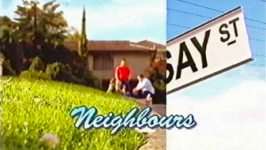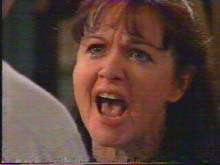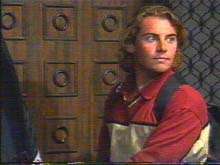|
.
Interviews
> David Myles
As a director for many years, David Myles has worked in both television and theatre. In the world of Neighbours, he has spent two years as the show's drama coach, as well as having directed more than 100 episodes. Here, he shares his thoughts on his time with the show with us, as well as explaining the vital role of the director.
|

|
Could you tell us a little about your career prior to directing Neighbours?
I worked on the floor at ATN and TEN straight out of school
before going to the UK as a teenager and then began work in the theatre. Firstly in the Repertory system and then at the National Theatre of Great Britain where I was privileged to be 'tutored' for many years by the best directors in the world - eventually becoming Staff Director there. During this time I worked all over the UK, Europe and the USA as well as being a 'Guest Director' at the Melbourne Theatre Company for a year. After 25 years overseas I returned to Australia in 1990 and continued to direct opera, music theatre and drama before starting with Neighbours in 1995. I now enjoy the challenge of working in these contrasting working environments.
You began directing Neighbours in 1997. Had you watched the show before this? Did you know what to expect?
I had been a fan of the show in the UK (as were most people!) but had lost regular contact since returning to Australia. When I was approached to be the Drama Coach in 1995, I did a crash course and of course spent the next 2 years closely involved with every episode and every character, so I certainly knew what to expect when I started directing.
Having directed a great deal of theatre productions during your career, how do you feel this compares to working on a daily soap opera such as Neighbours? What similarities and differences are there?
Directing soap opera is totally different from theatre and requires a different set of skills. The most obvious adjustment to be made in daily soap is pace. A director has much less time to do a great deal more - but on a less profound level. Whilst there are many specific technical considerations, which I personally enjoy, there is also a highly skilled technical crew who know how the system works and are therefore a great source of support. In most of my theatre work I have at least 4 weeks to put together a 2 hour show with an average of 6 actors - in Neighbours we prepare, shoot and edit the equivalent of a feature film with an average of 25 actors in the same amount of time! Sometimes we have 10 minutes to rehearse a scene which in the theatre would collectively take 4 hours. This means of course that directors have to develop a 'fast track' line of communication with the actors, and when this works the results are often amazing. I suppose the main dramatic difference is that Neighbours deals with many concurrent storylines which are trivial or touch upon, but rarely delve into subjects, whereas a theatre play usually explores a major subject matter in sometimes agonising detail.
What is a typical day like for you, when working on the show?
In the four week cycle of putting together five episodes of the show, no two days are the same but I suppose the closest to 'typical' are the rehearsal days in the studio. During a twelve hour day we usually have to rehearse between 30 and 40 scenes (I once did 53!!!) in 3 or 4 of the sets. Rehearsal consists of reading through the scene, discussing any character or plot issues with both regular characters and those who may only be in a single episode, plotting the physical movement of the actors, discussing the staging, prop and lighting requirements with the technical departments, running the scene several times for the actors and finally plotting the camera shots and writing them up for the D.A who in turn writes them up for the switcher and camera men. And as is apparent from the mathematics, there isn't a lot of time to do this! That why from time to time you will notice some scenes in which two characters will simply sit in the coffee shop or pub and talk without moving - sometimes in the course of a long day you just have to 'catch up'!!
|

|
Are there any scenes or episodes from the past six years that you are particularly proud of?
I remember some location scenes (particularly on 'Art Thursday'!) when we were able to do some creative camera and lighting set-ups - a deserted cottage with Ian Rawlings (Philip Martin), Ailsa Piper (Ruth Wilkinson), an open fire and dozens of candles comes to mind. Conversely I did a sequence with Jackie Woodburne (Susan Kennedy) when she was visiting a psychotherapist - three very powerful moving scenes totally focused on Jackie which had the crew in tears - and most of which didn't go to air because it was too disturbing for the time slot! I suppose because of my background the scenes I remember most are those which go beyond the surface of the narrative, and in the hands of experienced actors such as Jackie, Alan Fletcher (Karl Kennedy), Ian Smith (Harold Bishop) and Janet Andrewartha (Lyn Scully) they reach the heights of genuine drama. However I also enjoyed doing the 'Full Monty' sequence!!!
How did the show change during the years when you were directing?
The show hasn't changed that much - one of the secrets of its longevity I suppose. There always seems to be a balance between storylines (strong and silly!), characters (solid and superficial) and actors (experienced and newcomers) which maintains the momentum. From time to time there are attempts to focus on one or the other, but in the end it comes back to the question of balance.
Given that Neighbours has been running for so long and, presumably, everyone knows their jobs very well, exactly how much input does a director have on a show like Neighbours?
Directors are certainly in the category of having to 'jump on the
speeding train', so their personal input is somewhat limited. You are certainly directing to a brief, but within that you can influence the quality of those around you. Neighbours is one of the few shows where directors actually have a say in the script before rehearsals start, so script editing skills are definitely an asset. It is often said in directing circles that "if you can direct Neighbours well, you can direct anything!"
|

|
Have there been any Neighbours actors over the years that you particularly enjoyed directing and why?
As I previously mentioned, Jackie, Alan, Ian and Janet have been particular favourites because they consistently are able to bring a resonance to their characters which goes beyond the immediate narrative. At the other end of the age scale my first ever directing sequence was with Kym Valentine (Libby Kennedy) and Todd MacDonald (Darren Stark) - both gifted performers and both from totally different backgrounds. I have directed Todd in the theatre and we have an inherent understanding of the process which adds so much to the television experience. Of the 'newcomers', I watched Brooke Satchwell (Anne Wilkinson) develop into a fine young actress and recall one day at Melbourne Airport when she had to sustain a level of anxiety and sadness from 7am til 5pm under very stressful working conditions (hundreds of observers, flight deadlines, changeable weather) and did it with superb discipline. I also remember telling a disbelieving Daniel MacPherson (Joel Samuels) as he stood outside the Kennedy door with a surfboard under his arm ready to make his first entrance as an actor, that he was about to step into a new life! These actors have fine instincts which will develop with experience and ensure that they become accomplished all round actors.
You were part of the directing team for the 1998 season finale, which saw Joel almost die after becoming trapped underwater. What are your memories of this significant episode?
The 1998 finale was memorable for several reasons - firstly because I worked with two other directors (usually one rarely meets the other directors) and our work was integrated beautifully into a balanced dramatic sequence. I went out onto the other locations to watch Gary Conway and Chris Adshead (both highly skilled television directors) so that my work would complement theirs. We constructed dreadful weather conditions which heightened the intensity of everybody's work and the logistics (helicopters etc) were more like those of a feature film. Much of the show runs to a very tight schedule so the opportunity to break out of the routine always inspires both cast and crew.
After more than 18 years on television screens, Neighbours is still very popular the world over. What do you think accounts for this incredible success?
Acknowledging that the formula (whatever it is) is more important than any individual involved in the show. Achieving the balance between giving the audience what they expect - and a little more - (and even sometimes a little less!) Maintaining a consistently high level of technical competence. Ensuring that the storylines and characters consistently engage and entertain. There must be dozens of reasons - whatever is being done is working, and I imagine will continue to do so as long as the social climate remains the same.
Interview
by Steve. Added on 19th June 2004
Back
|

